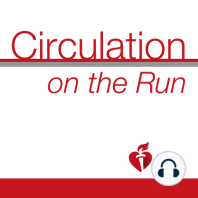16 min listen
Circulation December 10, 2019 Issue
ratings:
Length:
22 minutes
Released:
Dec 9, 2019
Format:
Podcast episode
Description
Dr Carolyn Lam: Welcome to Circulation on the Run, your weekly podcast summary and backstage pass to the journal and its editors. I'm Dr Carolyn Lam, associate editor from the National Heart Center and Duke National University of Singapore. Dr Greg Hundley: And this is Dr Greg Hundley from VCU health, the Poly Heart Center in Richmond, Virginia. Well, Carolyn, this week's feature analyzed a pool cohort of all patients in partner one and partner two, both the trials and registries. Patients had severe aortic stenosis and were treated with TAVR or SAVR and then were analyzed with respect to the development of prosthetic valve endocarditis. But more to come on that later. Dr Carolyn Lam: Let me start by telling you about my picks from this week's journal. So the first one is a really interesting natural experiment. First, do you think that a short term visit to a location with severe air pollution increases the risk of cardiovascular disease? Dr Greg Hundley: Well, Carolyn, I would say yes. Dr Carolyn Lam: Greg, you're too smart. But let me tell you what these investigators did. So their co-corresponding authors, Dr Araujo from David Geffen School of Medicine and UCLA, Dr Zhu from UCLA Fielding School of Public Health, and Dr Qiu from College of Environmental Sciences and Engineering in Peking University. These co-corresponding authors and their colleagues did a natural experiment by collecting urine and blood samples from 26 healthy adult residents of Los Angeles before, during, and after they spent 10 weeks in Beijing during the summer of 2014 and 2015. Dr Greg Hundley: I am really excited to hear this. Carolyn, what did they find? Dr Carolyn Lam: So traveling from less polluted Los Angeles to more polluted Beijing induced pro oxidative and pro inflammatory effects, which reversed after returning to Los Angeles. This is also the first human study associating exposures to polycyclic aromatic hydrocarbons with changes in paraoxonase 1, enzymatic activity, and circulating levels of hydroxyeicosatetraenoic and hydroxyoctadecadienoic acids. Cool, huh? Dr Greg Hundley: Absolutely. Carolyn, you did an awesome job. Very nice. Well, my article comes from the world of basic science and it's from Dr Philip Shaul at the University of Texas Southwestern medical Center. So Carolyn, in recent studies of obesity induced insulin resistance in mice with corroborating findings in human type 2 diabetics, this group, Shaul’s group, previously made the surprising discovery that the insulin resistance is driven by an altered post-translational modification in IgG that leads to enhanced activation of FCYR2B in endothelial cells. And as a result, there is an attenuation of insulin transcytosis across endothelial cells and delivery to skeletal muscle myocytes where up to 80% of glucose disposal usually occurs. Dr Carolyn Lam: Oh. Interesting, Greg. So what did the authors find in the study and how did these findings equate with obesity and hypertension? Dr Greg Hundley: Well, they found that hyposialyation of the Fc glycan on IgG is identified as a key contributing factor in obesity induced hypertension. And therefore low levels of IgG Fc glycan sialylation may identify individuals at greater risk of developing hypertension. In addition, the degree of sialylation of IgG may predict the relative response of an individual to any hypertensive therapy. Dr Carolyn Lam: Nice. So my next paper is from Dr Al-Lamee from Imperial College, London, and colleagues who studied the ability of a pre-randomization stress echocardiographic score to predict the placebo-controlled efficacy of PCI within the ORBITA trial. Now as a reminder, the primary results of the ORBITA trial showed us smaller than expected effect size of PCI in comparison with placebo in single vessel stable coronary artery disease on the primary end point of change in treadmill exercise time. Now in the current study, 183 patients underwent dobutamine stress echo cardiography before randomization, and
Released:
Dec 9, 2019
Format:
Podcast episode
Titles in the series (100)
Circulation August 30, 2016 Issue: Circulation Weekly: Your Weekly Summary & Backstage Pass To The Journal by Circulation on the Run
